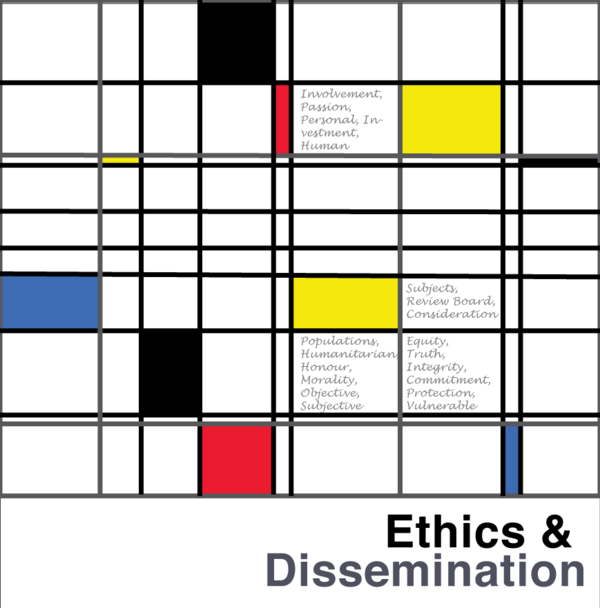Documentation:Research Commons/FIRE Talks/(Research) Ethics
Ethics and Dissemination

21st of March at 2pm
What role do ethics play in academic research, practice and dissemination? How can and should academics and grad students disseminate their work? How do we work with 'at risk' communities ethically, including sharing the outcomes of such work within those communities? Is it ethical to publish in journals that the subjects of that research will never be able to access? Is there a difference between ethical behaviour as defined by academic ethics and as defined by common sense? How do we ‘translate’ academic knowledge to the broader public? What are the benefits, hazards and risks of disseminating controversial work? How important should ‘academic status’ be in determining effective ways to disseminate our research? Should all journals be ‘open-access’? Join us for the last FIRE Talk of the semester on the 21st of March!
Submit your proposals for a 5 minute presentation by the 18th of March 2013. To submit your abstract, click here.
Interested in the topic but don't want to present? Attend the FIRE Talk as an audience member and join the discussion after the presentations! To attend without presenting, register here.
Light SNACKS will be provided!!!
Competition
Win $50 to Indigo.ca
Present at or attend an upcoming FIRE Talk and be entered to win a $50 Indigo.ca gift certificate
Two winners per FIRE Talk: One presenter and one attendee!
Want to know more about the FIRE Talks? Click here
Presentations
Social Justice and Ethics in International Fieldwork
By: Sarah Rudrum
Sarah Rudrum’s doctoral research is an institutional ethnography of maternity care and childbirth in a rural northern Uganda community. This talk examines ethical dimensions of research in difficult settings, and addresses the following questions: (How) Does working in a difficult setting influence research design? What is your responsibility to participants who are experiencing pressing needs?
Knowing Your Audience: Acculturation of Speech Genres as a Method of Support for Disseminating Knowledge
By: Matthew Waugh
Bakhtin (1986) conceptualized speech genres as our utterances and chains of utterances in our formal and informal language as having typical kinds of function and expression arising out of situated, social interactions. These interactions occur within classroom dialogue between teachers and students, among community members during round table discussions or brief exchanges between colleagues at the office. Speech genres are not only embedded in our oral communication but our literary work as well, including essays and journal articles and even the quick email. Within daily discourse there are speakers and listeners, writers and readers with various speech genres being utilized in purposeful and dynamic social interactions embedded in particular contexts and spheres of activity. This brief presentation will discuss why dissemination of research and mobilizing knowledge within communities our research is geared towards necessitates researchers to undergo an acculturation process of the speech genres our audience reads, writes, listens, and speaks.
A New Model for Scientific Communication Based on Open Access and Crowdsourcing
By: Sina Shahandeh
Why present?
- Practice presenting your research to an interdisciplinary audience
- Network with graduate students from across campus
- Receive feedback on your research in a low stakes setting
Useful Information
Date: 21 March 2013
Time: 2:00 pm - 4:00 pm
Location: Koerner Library, Room 216
Submission Deadline: 18 March 2013